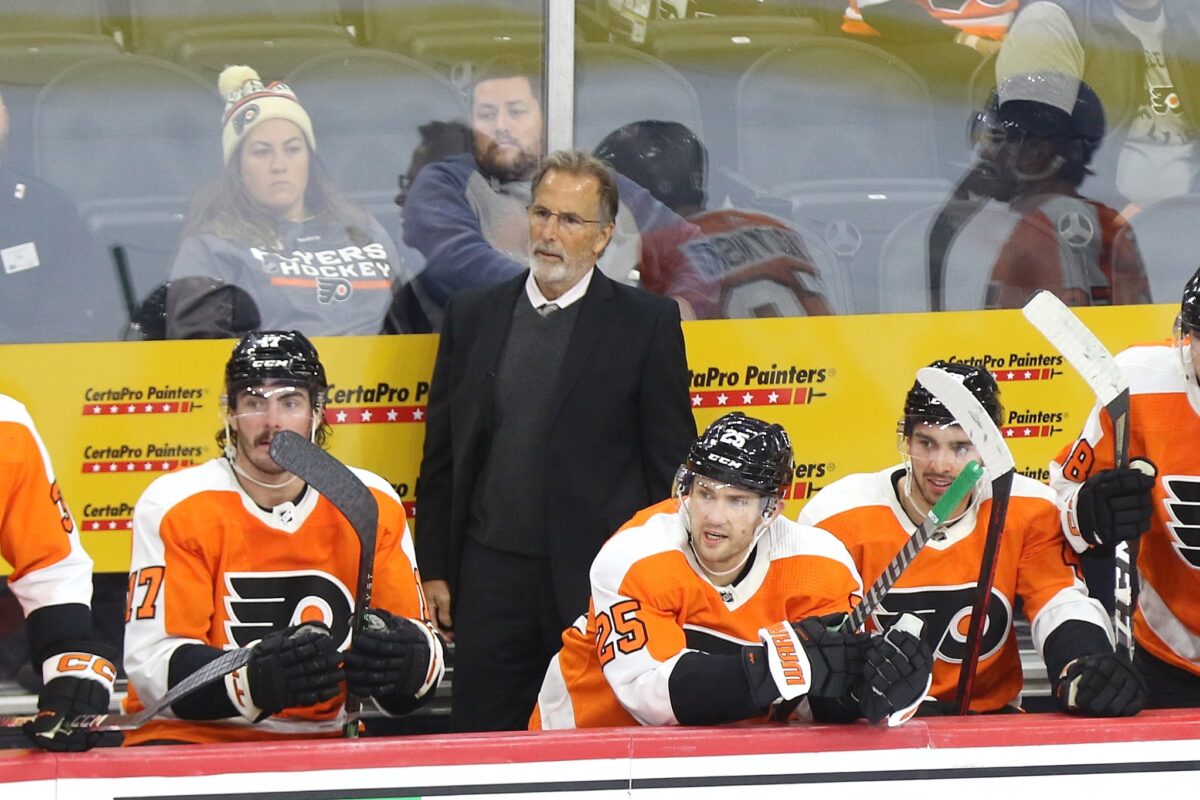On March 16, the Philadelphia Flyers’ record fell to 34-26-8 after a 6-5 loss to the Boston Bruins. The Flyers allowed three goals early in the third period, and four overall, and even their late push to tie the game came short. What were some takeaways from the defeat?
Ersson Was Never the Problem
After the Bruins’ six-goal effort, during which backup netminder Felix Sandstrom was completely left out to dry, one thing became clear—starter Sam Ersson has not been the problem recently. He was pulled in two of his last three starts, but that was more due to poor defense play than his. It was the same story in this one; only Sandstrom had to take the heat for the loss.

Sandstrom has no business being blamed for losing. The Bruins now hold the best record in the NHL, and it’s not like his minus-1.5 goals saved above expected (GSAx) performance was all that bad. It wasn’t good, but to only give up a goal and a half more than you’re supposed to as essentially an emergency option should, at least, be the expectation.
To that point, 4.5 expected goals for Boston are far too many for any team to allow. The Flyers, in a playoff hunt, cannot put themselves in that sort of position. The defense has to be better.
Related: Flyers Can Be Legitimate Playoff Threat if They Find Consistency
Ersson has also had to deal with this same defense. It’s not good enough for any goalie to consistently overcome. Ersson has done so in the past, but he can’t do it every night. Something has to improve with the defense; otherwise, these losses will continue. The Flyers have allowed six goals in three of their last four games, and that’s not all on the starter.
Tortorella Continues Hypocritical Logic
Head coach John Tortorella has never shied away from boldness. Last season, he was willing to bench anyone and everyone for a poor play, helping establish that absolutely nobody would be exempt from making bad plays. But that has completely changed this season, and it only applies to a select few. It has made the Flyers worse as a team.

Getting into what happened in this game, star winger Travis Konecny arguably had the worst game of his entire career. It mostly started after he had a breakaway chance that could have put the Flyers up 2-0, but he was stopped relatively easily, and the Bruins went the other way to tie the game.
But right after, Konecny had a wide-open net to shoot at on the power play, and an albeit bouncing puck went right by him, and he whiffed badly. This was all in the last few minutes of the first period so that Tortorella would have benched most players. He did it to Bobby Brink not too long ago—the one mistake he has ever made cost him his spot on the second line and caused him to be a staple of the fourth line or the healthy scratch list ever since.
This logic didn’t apply to Konecny. His game only got worse as time went on, proving to be one of the big reasons the team lost. Perhaps he is still feeling the effects of a two-week injury he suffered late in February during practice, but it is no excuse to play the way he did. The Flyers might not have won if he had been benched, but they would have been better off.
The issue with what happened is that Tortorella still only holds certain players accountable. He is prone to taking out his frustrations on the wrong player. That might be fine for a young coach at a lower level, but he’s a long-time veteran in the NHL — bias cannot be apparent. And it has.
Instead of putting Konecny down in the lineup after the first period, Sean Couturier was demoted from the first to the fourth line, while Scott Laughton had the opposite happen. Laughton struggled, being outscored 3-0 overall. It wasn’t a great game from him, and definitely one of Tortorella’s more regrettable decisions of the season — he has been a huge, if not the main, reason why the Flyers have been competitive.
In the end, Konecny’s numbers didn’t look too bad thanks to a few garbage-time goals from the Flyers, but his 36.3 percent expected goals percentage (xGF%) was both poor and didn’t quite do justice to how much he struggled. He will have to bounce back as soon as the Flyers’ next game.
Tippett, Frost Need to Stay Together
However, one of the good decisions Tortorella made in this game was pairing forwards Owen Tippett and Morgan Frost. Both have played their best hockey when paired, as exemplified by their 55.0 percent xGF% when they share the ice at even strength. And they were the two best the Flyers had on the ice the whole game.

It’s no secret that Tippett and Frost play their best when together. But they just haven’t been on the ice with one another enough. While 311 minutes together at even strength is a good amount, it could always be more. The Flyers are a better team when both are playing, so it would be nice to see them get out there more.
Despite the regulation loss, the Flyers are still in a decent spot for their playoff push. Of all the teams behind them in the Metropolitan Division with a real chance of making the playoffs (the 23-33-11 Columbus Blue Jackets are excluded), the Flyers have the easiest schedule left. Up three points on the New York Islanders for third place in the division with one extra game played, the Flyers will take on the Toronto Maple Leafs at Wells Fargo Center on March 19 to avenge their 6-2 loss at their hands on March 14.
